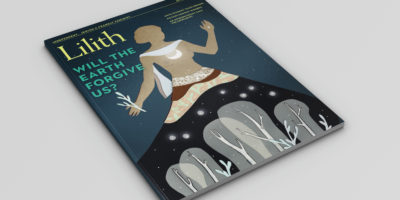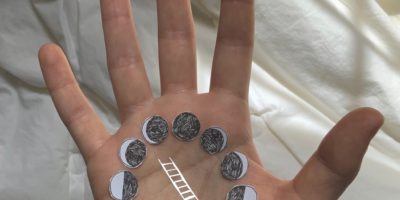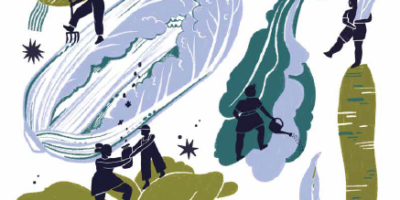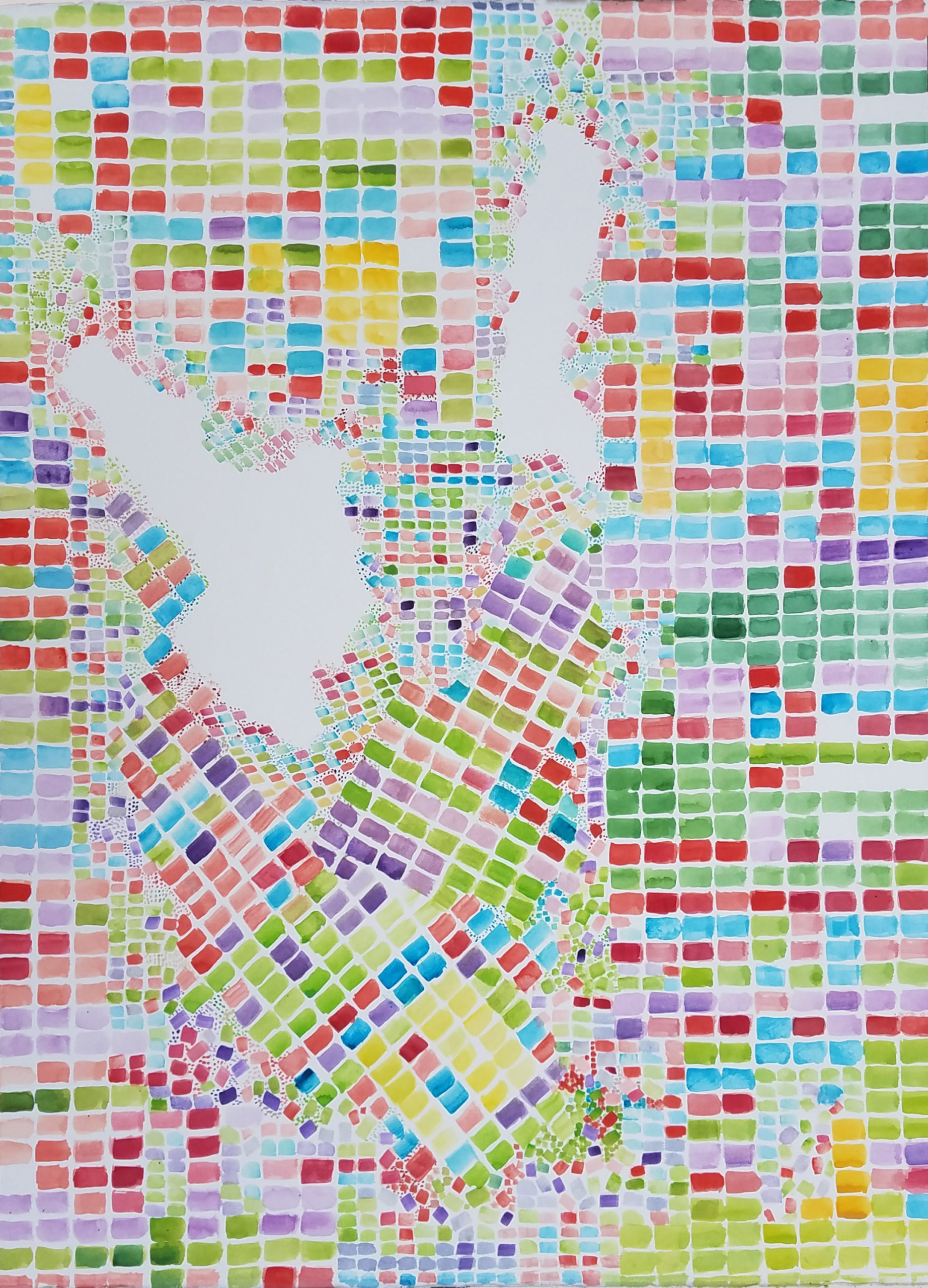
Fiction: This Has Been Declared an Unlawful Assembly
Third Prize in Lilith’s 2020 Fiction Contest.
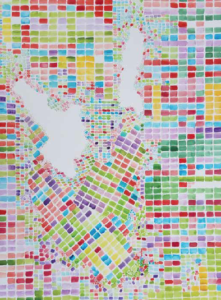
MICHAL GAVISH, CROP GENETIC, 2020; COURTESY OF LAMINA PROJECT; ©MICHAL GAVISH
THE CITY WAS burning and I had my first period cramps in a year. At first I had thought it was anxiety—death in the streets, cases piling up at the hospital—then I thought perhaps gas, as I do have a relatively delicate stomach. But no, pure uterine pain. Small flecks of blood in the toilet arrived that morning to prove its earnestness.
The curfew started in seven minutes. I quickened my pace. I’d almost certainly make it home in time, and even if I didn’t, no one was going to bother me. That was the point of the protests, I guess. That I could be swinging an AR15, cradling a Molotov cocktail, but with this outfit and this skin color? The cops might even give me a ride home. “Wouldn’t want you to run into those protesters, Missy.”
I’d been out there, this afternoon, at one of the tamer protests. I’d chanted. I had a faint sore throat to prove it.
MY SORE THROAT worsened overnight. The next day, I had a cough to accompany it. I felt exhausted. Guiltily, I texted Zoe that I couldn’t go to the protest in the park today. Hopefully I could go to one tomorrow. I was living in the little garden house out back since my university had closed. It had been a rundown garage for most of my life, until my dad, in one of his rare handyman moods, had turned it into a guest house with a bathroom, bedroom, and kitchenette. My old room had become my mom’s study, which she needed more than ever now that she was teaching from home. I went up to the house to find tea. I found the door wide open along with all the windows. Mom stood in the kitchen fanning the air with a cookie tray.
“I’m sorry for the smell, Rachel. I accidentally melted a spatula.” I stood in the doorway waiting for the acrid stench of plastic to hit me.
“I don’t smell anything.” Suddenly I understood. I backed out the doorway and hurried back across the yard. My mom stuck her head through the back window.
“Rachel! Where are you going?”
“Mom, I’m sick. I have it. You have to stay away from me.”
“What are you talking about?”
“I’ll text you.”
I explained in the family group chat. It must have been from the protests. I’d worn a mask, but we were still packed pretty close together. My mom asked if they should take me to the hospital. I said not yet, there was nothing they could do for me unless it got bad. I told them to watch for symptoms.
The next day, my mom left a bag of groceries outside my door along with a pile of leatherbound journals. The sticky note on top said, “I’ve been meaning to show you your grandmother’s journals and I figured that when you were stuck inside you’d want something to read. And I got you a journal of your own in case you feel inspired.”
Grandma Rachel. The original Rachel. She died before I was born, and I only remember the stories my mother told about her. She was born in London and grew up there, the child of two Warsaw Jews. She’d been a teenager during the Second World War, but had waited it out in a crumbling house in the English countryside before coming to the US at twenty. Her whole immediate family had survived. Her extended family had not been so lucky. She became a journalist, a mother, and a fierce organizer for women and immigrant rights. “Everything I am, I am because of her,” my mom had once told me. I believed her. And now, here were her journals. The interior of original Rachel’s mind.
And to be honest, I didn’t want to read them. I’m not sure I was in the mood to confront heroism and true sacrifice when I was feeling sorry for myself for being laid up with a glorified cold. I didn’t want perspective, if that’s what my mom thought she was gifting me. I flipped one open to a random page. It felt sacrilegious to start in the middle, but maybe if I found something interesting I could close it and say I’d read it all.
June 16th, 1940
And so we wait out here, and we’re supposed to be grateful. And you know? Even knowing that bombs are falling on London, that all the Jews in Warsaw have probably been slaughtered, we sometimes are. It’s summer here. That doesn’t stop.
I ran my finger over the date. Funny, it was the second week of June. Here too, between the protests and the plague-closed city, summer had bloomed. “Alright, original Rachel, you win this round,” I whispered. Suddenly exhausted, I slipped beneath the covers and fell into a deep and dreamless sleep.
I WOKE TO THE SOUND of sirens and megaphones. The eerie message projected almost nightly, “This has been declared an unlawful assembly. Please disperse immediately. If you do not, you will be arrested.” The east side police precinct was only six blocks away. The protests sometimes happened at others in the city, but clearly they’d chosen this one today. I should be there. Zoe probably was. It had been Zoe who got me into it. We’d been walking back from class, Zoe’s curls waving in the breeze as if to reflect her animated gestures.
“Come on, Rachel. The measure of a society is how well it treats its prisoners.”
“You didn’t make that up.” I scoffed.
“No, someone wiser did. But it’s true!”
“All the causes in the world to fight for, and you choose criminals?”
“Oh Rachel. These aren’t real criminals! People bomb villages. People let migrants die of thirst in the Sonoran desert, rather than let them come here to pick crops and pay taxes they won’t benefit from. Those are criminals. These people? They sold weed or couldn’t pay their parking tickets! Their poverty is criminal, the way the police rough them up is criminal.”
“Point taken! I’ll come to the protest.” I agreed more to stop the lecture than anything.
I did go to the protest, and to the one after that, and the one after that. I started paying attention to the news. There were weekly articles about some poor kid shot during an arrest. The kids never looked like me.
Now, I’d stood too close to one wrong sneeze and I’d have to listen to Zoe getting pepper-sprayed from afar, laid up for two weeks during the most chaotic protests of the year. I made myself soup. As I ate it, I noticed the black journal from yesterday still lying on the table. Tentatively, I cracked open, this time to an entry in July. Original Rachel was trying to fill the hot and anxious days. She helped in the garden, brought and listened to the radio in secret whenever her parents were out of earshot. Her mom said the radio tore at her nerves. Original Rachel could see why. It felt like the world was falling. The next line caught my attention, “It is the most mundane feeling and I truly believe I should be shot for it, but I’m bored. I’m sick of only seeing my family.” I laughed out loud. Well then, Grandma Rachel and I had a few things in common. My reverie was broken by the sound of a police helicopter flying low overhead. I called Zoe. She answered on the sixth ring.
“Are you ok?” I finished the question with a sequence of dry coughs.
“Damn Rachel, you sound as bad as I do.” She wheezed back.
“Did you get tear-gassed?!”
“Yeah. I was wearing goggles though, so my eyes are fine. I just breathed it in. Even through the mask, it’s pretty rough.”
“Where are you?”
“In some random person’s front yard on 47th street. They had a bench, and I’m hoping they’ll understand.”
“Zoe, maybe you should stop going. It doesn’t seem like they’re going to listen to the demands. They’re going to sign the police union contract for another year. That’s clear. You could get seriously injured! They’re getting nastier.”
“So let them! They’ll be more videos of them bowling down grandmothers. Tear-gassing singing protesters.”
“You were singing?”
“OK. I wasn’t singing. You know how I sound. But I was supporting them.”
I laughed and it turned into a rasping cough.
Zoe sighed. “I hope you get better before the mayor gets me killed. I’d like to see you.”
“Come on Zoe, there’s no way Mayor F. wants them to be this rough with the protesters. He just doesn’t have the power to fight the police chief on his own.”
“I always forget that you know him.”
“I don’t know him. I volunteered for his city council campaign four years ago. And he came to my brother’s bar mitzvah. I was a literal kid last time I saw him. There’s no way he remembers me.” I heard sirens approach on the other side of the line.
“You should go home Zo.”
“I will. Get better soon, Rachel.”
THAT NIGHT, I couldn’t sleep. I felt hot and cold at once, and achy. I grabbed Grandma Rachel’s diary, and cracked open to the next entry.
July 8th, 1940
I got angry at Lev today. He said he wished Churchill would just sign a deal with the Nazis. He’s sick of the war, and he wants to go back to school in the fall. He said it didn’t matter if the Nazis took the continent. That we’d be safe here. I told him it was a horrible thing to say, and that people were being killed every day. He said if I cared so much then I should go join the fighting. That all I did was bring a few meals to the shelter and make some socks. He also said I was probably just upset because it was my “bleeding week,” as he calls it. The most annoying thing is that I was bleeding, but that had nothing to do with why I was angry. I know he’s only ten, and I don’t want him to know how bad things are. I just can’t bear to hear him say things like that.
My own period had finished just yesterday. The IUD I had gotten when I’d first gone off to college (more to celebrate the potential of sex than in recognition of actually having any) made it irregular, and it only appeared every few months. I always got the sense its appearance forebode bad luck, which in this case, I guess, it had. But like Grandma Rachel, I hated nothing more than when people pretended it affected what I cared about. I closed the journal. I wondered where Zoe was now. I worried that I was wrong, and that the mayor really might order something terrible. But what could I do about it? Literally nothing, at least for another week until I wasn’t a viral vector.
I SLEPT UNTIL NOON the next day. My mom had left more groceries outside the door. At least no one else in my family had gotten sick from me. That would have been too much to bear. I got the sense that they hadn’t loved my attendance at the protests, and bringing home the virus probably hadn’t improved that opinion. I made myself tea, and tried to do a crossword puzzle but my brain felt thick and heavy. My eyes drifted to the journal labeled “1945” that still lay on the kitchenette’s table. Suddenly, I felt an urge to flip to the final page. To know how the story ended. I know she hadn’t died, obviously, or none of us would have been here. But how had she felt when she’d closed that journal?
May 25, 1945
I could have gone across the channel. Some boys, and even a few girls, did. I could have been in France, disguised, gun in hand. And I probably would have been shot. Most were. But some weren’t, and even those that were probably helped someone. I stayed in Lancaster, planting peas, while millions were slaughtered. What does one do with that? How am I supposed to live? I wasn’t cruel here, but perhaps I wasn’t kind enough. Perhaps apathy is cruelty. Perhaps fear and stasis cannot exempt me. I shirked a duty, and I will have to live with that.
I saw it now. Rachel the journalist, Rachel the organizer and advocate. Rachel atoning for the fact she hadn’t been a hero when she was fifteen years old and terrified. And that was why my mom had given me the journals. It wasn’t what Grandma Rachel had done during the war, it’s what she hadn’t. I thought about Zoe. She would have gone over the channel. Well, my mom might be trying to make me feel better, to let me know I had nothing to atone for, and I was going to make that true. I found my phone and fumbled for a number that I hadn’t called in four years, since I was a teenager volunteering on a city councilman’s campaign who would someday become mayor. He answered on the second ring.
“Who is this?”
“This is Rachel.”
“Rachel.” A pause as he tried to place it. Five seconds. “Oh gosh, Rachel, yes. It’s been a while. I didn’t know you still had this number.”
“Yeah, I guess you haven’t changed it since that campaign.”
There was an awkward pause. He was clearly trying to extricate himself from the unwanted call. I cut in fast, “Mayor, you have to stop the teargas. You have to stop the pepper spray. There’s still a pandemic going on, one that targets the lungs.” I coughed, as if for emphasis.
“Is that why you sound like that? Did you get gassed at a protest?” His voice rose in concern.
I paused, perhaps the truth is not always mandatory. “Yes.” I rasped even harder, praying that the words would come if I just kept speaking, that no holes would appear. “Yes, this is how I sound. I wasn’t out past curfew. The crowd was fairly calm, but I got jostled to the side and … It’s terrible. It’s not what you want for your citizens. I know it’s impetuous to call you like this, but I had to tell you—I had to warn you. Think about it. What do you want your legacy to be? A man who let his citizens get beaten and gassed just because you wouldn’t fire a couple of cops? Held hostage by his own police force because you couldn’t get them to boot out the bad ones? Look, I want a quiet city back, too. But not a quiet bought of injustice. Not one where citizens get different criminal justice systems based on their skin color.”
“Look, Rachel, I’m sorry that you weren’t treated right, but the policemen were just doing their jobs. This has been blown out of proportion. It was a tragedy what happened, but the kid they killed was a criminal—”
I cut him off in rage. “The ones in power get to decide who’s a criminal! Think about your uncle in Birkenau. Or is that just a story you trot out for campaign rallies?” The words shocked us both.
“Rachel, it sounds like you’ve had a stressful night. Give my best wishes to your parents and your brother. I hope you feel better soon.”
I stayed silent as he clicked off the call. What would original Rachel think of me? I almost opened the journal for comfort, but worried that it would say too much. Sometimes perspective is a mirror, and I didn’t want one right now. I fell asleep quickly and stayed that way. There were no sirens that night.
I WOKE TO MY phone ringing over and over. I answered it with barely opened eyes.
“Hello?”
“Rachel, it’s happened!” Zoe was talking way too loud and way too fast. “They’d done it. They’ve listened. They won’t sign the union contract, not until those cops are fired. Not until they set up bias trainings, get some unarmed officers for care checks and mental health calls, and reopen all the unaddressed force complaints. Mayor F. said he wouldn’t sign a contract that didn’t include all of those—that was the minimum, he said, but he’s hoping for more. I can’t believe you worked for the guy. He’s actually pretty decent. I mean, I suppose he could have done something to stop us getting roughed up so badly, but better late than never.”
“Slow down, slow down! I just woke up.”
“It’s almost 1PM!”
“And I’ve been sick! So they really are renegotiating the contract? And the mayor asked for it?”
“Yeah, really.” She rattled on for several minutes more before hanging up to join a celebratory march downtown. I smiled at the silent phone, then got up to make tea. For the first day in a week, my cough was gone. My throat still felt wrecked, but even that was mending.
“Oh Rachel, I wish I could tell you about this,” I whispered to the pile of journals. There was someone I could tell though, that would be almost as good. I found the blank journal that my mom had bought for me.
I began on the first page, “Dear future Rachel,”
Avital Balwit is a writer of short stories, poems, and essays from Portland, Oregon. A recent college graduate, she is heading to Oxford to research political theory and existential risks to humanity.

